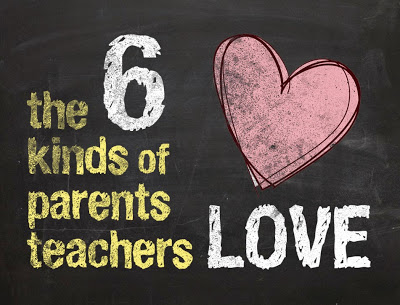On Thursdays I post from the vault. In honor of Teacher Appreciation Week, here is a post from October 2014.

Most of our kids are settling back into the school routine and adjusting to their new teachers. I’ve written before about what kind of school parent I am, and in one episode of Mama Said, Sarah and I discussed my ambivalence about volunteering in their classrooms. Short story, I think a lot about what my kids’ teachers think of me.
When
I discuss my own parenting style with them—including teachers in my
social circles—I keep hearing a lot of similar things: That it’s a
collaboration. Parents and teachers have to work together as a team to
help our kids reach their potential. So I’ve been asking them questions:
What do teachers want us to be? What kind of parents do teachers love?
Here’s what I’ve learned from my teacher friends:
1. Honest
Teachers
love honest parents. Not the kinds who are always making excuses for
their kids. Not the ones who hide a certain past problem or need from
teachers out of embarrassment. And certainly not the kinds who
misrepresent a statement or situation to another parent or authority. If
you have something to bring up or discuss with your child’s teacher, do
it. Your kids won’t learn honesty if they don’t see it from you.
2. Understanding
a little empathy. That’s all teachers want. They don’t always control
the curriculum. The size of the classroom isn’t their decision. How the
school uses resources is out of their control. Don’t take your
frustrations out on teachers, especially about things that fall beyond
their influence and outside their authority. Remember that past
successes with a specific teacher—whether it’s your own kids or other
kids you know—isn’t a guarantee of success with a different child today.
Some kids need to work harder or get extra help…and it’s not always
the teacher’s fault.
3. Organized
Once
kids leave the school building, teachers have very little sway on what
kids do. So if your kid isn’t finding the time to study, finish
projects, or stay on top of homework, guess who might need to share just
a teensy bit of the blame? Kids aren’t always ready to bear full
responsibility for their organization, so sometimes they need their
parents’ help. Set and keep consistent bedtime hours. Limit their phone
or screen time. Schedule homework time and hold them to it. Make sure
they get a little exercise. And plan ahead. Don’t make them late because
you forgot to pack their lunch. (Kids don’t like being late, and
teachers don’t like it either.)
4. Respectful
It
can be difficult with certain people—I understand. But trust your
child’s teacher. They know what happens in class, because they’re
present. (You’re not.) That means working together for solutions to
problems, and it means listening. If your teacher gives you advice for
helping a child learn? Take it seriously, just like advice you might get
from your child’s doctor. If a problem comes up, talk to the teacher
first rather than going over their heads with administration. And never,
ever talk negatively about a teacher in front of your child.
5. Involved
I
know, I know. This from the I-don’t-volunteer mom. But volunteering is
one thing. But being involved at the most basic level by checking
folders, making sure homework gets done, showing up at school programs
or Open House? That’s required stuff. The best and highest-performing
schools have as much to do with parental involvement than anything else
6. Caring
Teachers
are at school before your kids arrive and are often there long after
the kids leave. They attend training and meetings. They have to work
with other teachers and deal with the same administrative politics as
anyone else. They work hard to make their rooms cheerful and inviting
(sometimes at their own expense). They design lessons to engage your
kids and make sure they’re ready for the world. It’s a hard job. They’re
not asking for a parade. But saying “thanks” every once in a while via a
short note or small gift goes a long, long way.
I
told a couple of elementary-school teachers about this post and asked
them What’s one thing you wish parents knew? Here’s what one said: “I
wish parents could understand how much I care for their child and how I
worry about these kids. Each one becomes a large part of my life, and my
thoughts are always about what that child needs. I wish for support
from home and for parents to work with their children—mainly in reading.
I want us to work as a ‘team’ for the betterment of their child.”
Another
one: “Children need to know how to work with all kinds of people, so it
is important for them to learn to adjust to different teaching styles
and personalities. We don’t know at the elementary level what our
children will grow up to be; nor do we know what the personality of the
people they will work for or with will be like. We can encourage our
children to look for positive traits in all people, to notice traits
that promote success, and to work diligently with a constant goal of
self-improvement. The vast majority of teachers want the best for their
students.”
The bottom line? Teachers love your kids,
too. They want the best for them, but need you to have their backs. Show
them some appreciation…you might be surprised at the results.
